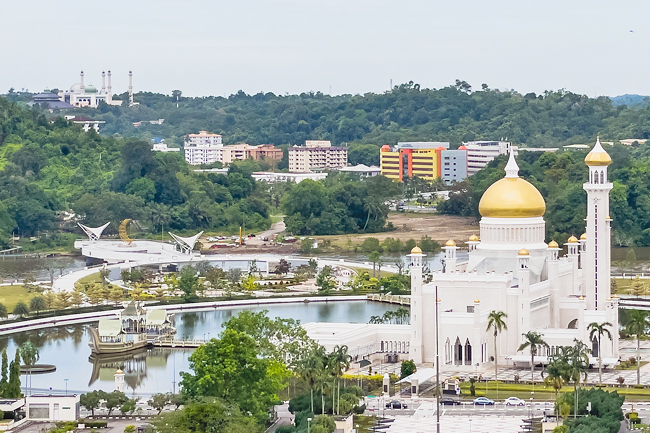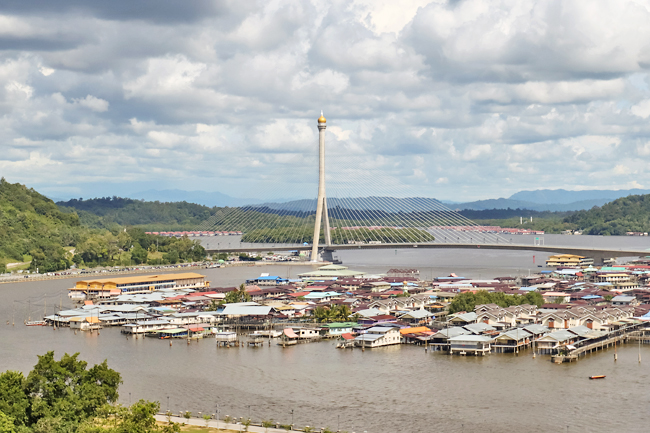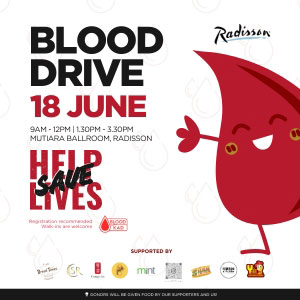James Kon
The Wawasan Brunei 2035 Supreme Council recently published the Wawasan Brunei 2035 Report (2015-2022), which provides an indication on the progress towards achieving Brunei Vision 2035’s three main goals.
The report was prepared in collaboration with ministries, agencies and stakeholders and presents information on the data and initiatives.
The report also provides an overview of future trends, challenges and opportunities in a rapidly changing, competitive world landscape which aims to enhance readiness for the emergence of megatrends such as the Industrial Revolution 4.0 (IR 4.0), climate change, the digital economy driven by the Internet of Things (IoT) that will offer opportunities, challenges and new norms in the Sultanate’s move towards achieving the vision of the future.
GOAL 1: EDUCATED, HIGHLY SKILLED AND ACCOMPLISHED PEOPLE
Brunei Darussalam’s ranking in the Programme for International Student Assessment (PISA) released by the Organisation for Economic Co-operation and Development (OECD) is one of the indicators to measure the country’s achievement under Goal 1.
PISA provides an overview of the competence of 15-year-old students in reading, science and mathematics subjects respectively. Brunei is ranked 60 in terms of reading, 51 for mathematics and 50 for science. Overall, Brunei ranked 53rd out of a total of 77 listed countries in PISA 2018.
According to the report, the country has continued its commitment in developing high quality human capital.


It is the aspiration of the country to ensure a first class education system that is holistic and focussed on ensuring students in all levels are equipped with current knowledge and skills and upholding the values of Malay Islamic Monarchy (MIB).
A strong training and education system will ensure all individuals possesses the opportunity to progress fast according to each respective potential and become a productive as well as high quality workforce filling the needs of the country and economy.
Outlining efforts toward strengthening the education system, the report said that a high-quality students’ literacy and numeracy programme for early childhood learning can provide a high return in learning outcomes in all levels of education.
Therefore, the Ministry of Education (MoE) has given focus to early command of literacy and numeracy as foundational skills to build and learn more complex skills. Various efforts are also being implemented to raise the quality of students’ literacy and numeracy in the country, such as strengthening the delivery of basic education through professional development programmes for teachers, including a literacy and numeracy guidance programme.
Monitoring of students’ level is actively carried out based on Brunei Darussalam Literacy and Numeracy National Standard (BDLNNS). Through such standards and assessment methods carried out through Student Assessment Tracker (SAT), more suitable intervention or support for needs of each student can be implemented by the teachers.
On quality of learning and teaching at schools, the MoE and Ministry of Religious Affairs (MoRA) have implemented efforts to ensure the quality of teachers is constantly improved through programmes focussing on guiding teachers towards student-centred learning.
The quality of teaching is measured using the Brunei Teacher Standard – Teacher Performance Appraisal (BTS-TPA), which officially began in August 2014.
The report also touched on student learning performance, religious education, Al-Quran reading, equal educational opportunities, opportunities to continue education after secondary education, transformation of technical and vocational education, national human resource developments as well as efforts in national workforce management, lifelong learning, reskilling and upskilling.
On youth unemployment, the report highlighted that there are several challenges, including ensuring that modules and the curriculum at the technical and vocational as well as higher education level are always relevant and suitable to the needs of industry.
Based on a workforce study conducted by the Department of Economic Planning and Statistics, Ministry of Finance and Economy, the youth unemployment rate for those aged 15 to 24 years old was 23 per cent in 2021. The rate of unemployment has shown a decrease as compared to 25.8 per cent in 2020. However, the rate is still high compared to the rate of youth unemployment in ASEAN member countries.
The rate of ‘Not in Employment, Education or Training’ (NEET) is the percentage rate of youth in Brunei Darussalam aged 15 to 24 years old who are not in employment and have not received education or training within a period of four weeks before the Workforce Study was conducted.
Data on NEET rates can complete the data on the rates of youth unemployment and give a more comprehensive overview about potential youth labour market entrants.
GOAL 2: HIGH QUALITY OF LIFE
The progress indicator for Goal 2 is based on the Human Development Index (HDI) released by the United Nations Development Programme. With a score of 0.829 in 2021, Brunei Darussalam is ranked 51st out of 191 countries in the HDI.
Goal 2 aims to ensure that Brunei Darussalam will have a high quality of life on par with other major countries in the world.
To achieve this goal, focus is given on a holistic ecosystem covering various aspects of life such as providing vital facilities and infrastructure, the nation’s security, preserving the environment and providing social protection for all walks of life in the community.
One of the important aspects is health. Brunei Darussalam has emphasised health as one of the main strategies in Brunei Vision 2035 that can contribute to achieving high quality of life.
The government is committed to providing healthcare services that are of quality, fair, comprehensive and easily accessible by the citizens and residents of the country.
Various efforts have been implemented in ensuring health in the country is guaranteed.
Overall, the health status of citizens and residents in Brunei Darussalam has increased and is comparable to developing nations. For example, the life expectancy rate from birth has increased from 77.2 years in 2014 to 77.4 years in 2019.
Initiatives increasing the quality of life and well-being include provision of and access to health and education, infrastructure and public facilities, welfare and community, safety, environment, providing public service and infocommunication technology to achieve better quality of life along with the country’s economic growth.
The government’s efforts positively impact public welfare and become a catalyst to the development of a more resilient, inclusive and dynamic country through a whole-of-government and whole-of-nation approach with the involvement of private sector, non-governmental organisations (NGOs) and the public.
An important approach in improving people’s well-being and quality of life is by improving quality of services in healthcare and welfare assistance.
Additionally, there have been achievements in steering and maintaining security and peace of the country, such as eradicating crimes and enhancing law enforcement.
Other efforts include the implementation of safety in the workplace, environmental protection and providing connecting infrastructure such as road, water and air. These achievements and progress have contributed to the country’s stability and social harmony and unity, including bilateral relationships regionally and internationally. The success was achieved even as the country faced challenges from changes in global environment, such as efforts in dealing with the COVID-19 pandemic.
The report notes that progress, prosperity and stability have been achieved from the country upholding its core values of MIB and the concept of Zikir Nation.
Islam is the guiding principle in the governance of the state, based on Al-Quran and As-Sunnah according to the understanding of Ahli Sunnah Wal-Jama’ah and the Mazhab Shafi’e, which unites Bruneians in peace, tranquility, and harmony. Therefore, it is important to make sure that momentum continues through a whole-of-nation approach and identify future priorities in efforts to ensure all citizens and residents in the country, especially future generations, can continue to enjoy the best quality of life.
The report also touched on social security and community, national welfare system, child protection, inclusive community, environment, provision of services, public infrastructures and facilities, housing facilities, water supply, energy supply, land use planning and developmental control, drainage system, flood mitigation, connectivity and public transport, infrastructure development and other public facilities.
GOAL 3: DYNAMIC AND SUSTAINABLE ECONOMY
For the third goal of a dynamic and sustainable economy, Brunei Darussalam aims to be among the top 10 countries in the world in terms of gross domestic product (GDP) per capita (purchasing power parity, PPP.)
According to the World Economic Outlook October 2022 published by the International Monetary Fund (IMF), Brunei was ranked 10th out of 195 countries in the world in terms of GDP per capita (PPP) in 2021.
The development of the country’s economy has become one of the main priorities of Brunei Vision 2035 towards reducing dependence on the oil and gas sector by increasing development of the non-oil and gas sector as well as the development of the private sector.
The country’s commitment towards achieving the goal supports the rapid development and maintainenance of a high standard of living of the people.
Numerous government initiatives have been implemented, with a focus on strategies that emphasise growth and economic diversification and generate employment opportunities driven by the private sector in priority sectors identified through the improvement of productivity, investment and the use of technology and innovation, stability and strengthening of the economy.
Efforts have been carried out by relevant parties from ministries, departments and other government agencies related to economy as well as private sector, civil service and NGOs through whole-of-nation and whole-of-government approaches.
In 2021, the Brunei Darussalam Economic Blueprint was launched and implemented under the purview of Brunei Vision 2035’s economic working committee. The blueprint plays a significant role as a ‘guiding principle’ to align strategic plans, master plans and government agencies’ policies toward achieving the third goal of Brunei Vision 2035.
Six aspirations are outlined supported by more than 30 directional policies. Aspiration 1 is Productive & Vibrant Business, Aspiration 2 is Skilled Adaptable & Innovative People, Aspiration 3 is Open & Globally Connected Economy, Aspiration 4 is Green & Sustainable Environment, Aspiration 5 is High Quality & Competitive Economic Infrastructure and Aspiration 6 is Good Governance & Public Service Excellence.
The report also highlights the development of priority sectors, GDP, foreign trade, consumer price index, fiscal performance, employment and others.
The Wawasan Brunei 2035 Report (2015-2022) is available on the Prime Minister’s Office website and Wawasan Brunei 2035 website.






